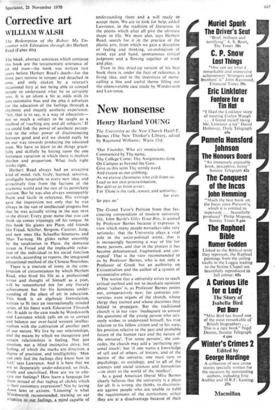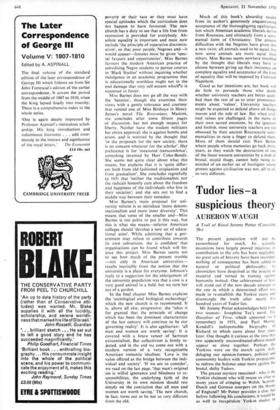New nonsense
Henry Harland YOUNG
The University as the New Church Hazel E. Barnes (The New Thinker's Library, edited by Raymond Williams: Watts 15s)
`Our Founder, Who art omniscient, Commenced by Thy name, Thy College Come; Thy Assignments done On Campus as beyond the Gate.
Give us this term Thy termly word.
And excuse us our cribbing, As we excuse classmates who crib from us. Lead us not into procrastination, But deliver us from error: For Thine is the rank, tenure, and seniority, for ever.
So pass us.'
The Grand Tutor's Petition from that fas- cinating compendium of modern university life, John Barth's Giles Goat-Boy, is quoted by Professor Barnes because it expresses 'a view which many people nowadays take very seriously: that the University plays a vital role in the socio-political arena, that it is increasingly becoming a way of life for many persons, and that in the process it has become dehumanised, fragmented, and cor- rupted'. That is the view recommended to us by Professor Barnes, who is not only a Professor of Greek but an authority on Existentialism and the author of a system of existentialist ethics.
The notion that a university exists to teach critical method and not to inculcate opinions about 'values' is, as Professor Barnes points out, comparatively new; for centuries uni- versities were organs of the church, whose clergy they trained and whose doctrines they helped to propagate. But the traditional church is in her view 'inadequate to answer the questions of the young person who seri- ously wishes to understand himself, his true relation to his fellow citizen and to his state, his position relative to the past and probable future of the human race and the nature of the universe'. 'For some persons', she con- cedes, the church may add a 'perfecting per- sonal touch': but 'if one wants a knowledge of self and of others, of history, and of the nature of the universe, one must turn to psychology, to sociology, and to all of the sciences and social sciences and humanities —in short to the world of the intellect'.
As a good American liberal Miss Barnes clearly believes that the university is a place for all. ft is wrong, she thinks, to discrimin- ate against people who are unable to fulfil the requirements of the curriculum; either they are at a disadvantage because of their poverty or their race or they must have special aptitudes which the curriculum does not happen to have favoured. The new church has a duty to see that a life free from repression is provided for everybody. Ab- solute equality is important and must now include 'the principle of reparative discrimin- ation', so that poor people, Negroes and—it would appear—females must be given 'spec- ial favours and opportunities'. Miss Barnes favours the modern American practice of subsidising Negro students to pursue courses in 'Black Studies' without inquiring whether indulgence in an academic programme that is educationally worthless might not in the end damage that very self-esteem which'it is supposed to foster.
Miss Barnes does not go all the way with the 'heretics', though she examines their views with a gentle tolerance and courtesy that remind one of Miss Birdseye in Henry James's novel The Bostonians. Maoism, she concludes after some fifteen pages of discussion, has not enough respect for liberty. Neither have the student militants her entire approval; she is against bombs and arson, and is worried by the thought that 'in the proposals for the new society, there is no concern whatever for the scholar'. Her preference is for 'measured transcendence', something invented by Herr Cohn-Bendit. She seems not quite clear about what this means, but explains that it is 'quite differ- ent both from old-fashioned utopianism and from gradualism'. She concludes regretfully (p 103) that 'neither the traditionalists nor the radicals honestly care about the freedom and happiness of the individuals who live in their societies'; and she sets out to find a middle way between their remedies.
Miss Barnes's main proposal for uni- versity reform is to introduce 'more denom- inationalism and more inner diversity'. This means that some of the smaller and—Miss Barnes is too polite to put it this way, but this is what she means—inferior American colleges should 'develop a new set of educa- tional aims'. While admitting that a gov- ernment may refuse to contribute towards its own subversion, she is confident' that organisations can be found which will fin- ance this project. Miss Barnes seems not to see how much of the present trouble —not only in American universities— results inevitably from the notion that the university is a place for everyone. Johnson's reply to a suggestion for the enlargement of the university population was that a cow is a very good animal in a field, but we turn her out of a garden.
In the final chapter Miss Barnes explains the 'sociological and biological eschatology' which the new church is to recommend. It is, above all else, progressive; she 'takes it for granted that the principle of change which has been the dominant characteristic of the last century will continue to be our governing reality'. It is also egalitarian: 'all men and women are worth saving'. It is covered with a brave veneer of Sartrean existentialism. But collectivism is firmly re- jected, and in the end we come out with a modern version of a very recognisable American romantic idealism; 'Love is the value offered as the bridge between the indi- vidual and society'. 'If we are to consider', we read on the last page, 'that man's original sin is wilful ignorance and blindness to re- sponsibilities, the underlying faith of the University in its own mission should rest simply on the conviction that all men and women are worth saving.' The new church, in fact, turns out to be not so very different from the old.
Much of this book's absurdity results from its author's generously unquestioning acceptance of the thoroughgoing egalitarian. ism which American academic liberals derive from Rousseau, and ultimately from a senti- mental form of Christianity. The present difficulties with the Negroes have given this a new twist; all animals used to be equal, but now some animals are more equal than others. Miss Barnes seems nowhere troubled by the thought that liberals may have to choose between giving up their insistence on complete equality and acceptance of the kind of equality that will be imposed by Comrade Napoleon.
Good as her intentions are, her book will do little to persuade those who doubt whether university teachers are better quali- fied than the -rest of us to utter pronounce- ments about 'values'. University teachers might be expected to defend above all things reason and the rule of law. But when civil- ised values are challenged, in the name of their own sacred emotions, by the ignorant and foolish, most university teachers are too obsessed by their ancient Rousseauite senti- mentalities to raise a finger to defend them. More of theM should visit West Berlin, where people whose memories go back thirty years, as they watch the destruction of one of the finest western universities by a mob of brutal, stupid thugs, cannot help being re- minded of an earlier set of hooligans whose protest against civilisation was not, all in all, so very different.















































 Previous page
Previous page